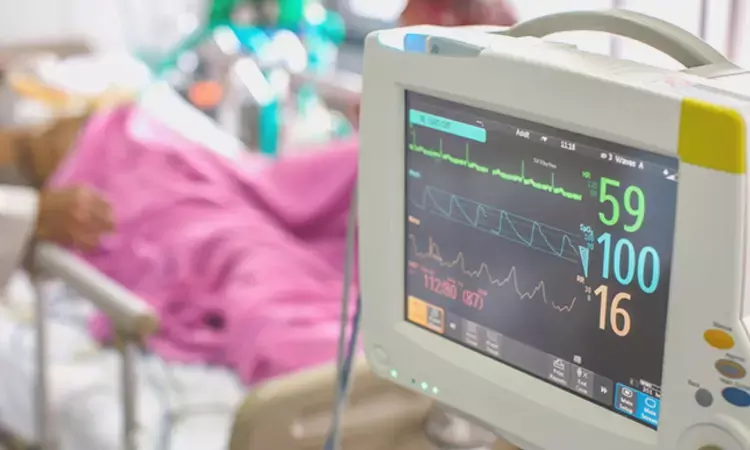- Home
- Medical news & Guidelines
- Anesthesiology
- Cardiology and CTVS
- Critical Care
- Dentistry
- Dermatology
- Diabetes and Endocrinology
- ENT
- Gastroenterology
- Medicine
- Nephrology
- Neurology
- Obstretics-Gynaecology
- Oncology
- Ophthalmology
- Orthopaedics
- Pediatrics-Neonatology
- Psychiatry
- Pulmonology
- Radiology
- Surgery
- Urology
- Laboratory Medicine
- Diet
- Nursing
- Paramedical
- Physiotherapy
- Health news
- Fact Check
- Bone Health Fact Check
- Brain Health Fact Check
- Cancer Related Fact Check
- Child Care Fact Check
- Dental and oral health fact check
- Diabetes and metabolic health fact check
- Diet and Nutrition Fact Check
- Eye and ENT Care Fact Check
- Fitness fact check
- Gut health fact check
- Heart health fact check
- Kidney health fact check
- Medical education fact check
- Men's health fact check
- Respiratory fact check
- Skin and hair care fact check
- Vaccine and Immunization fact check
- Women's health fact check
- AYUSH
- State News
- Andaman and Nicobar Islands
- Andhra Pradesh
- Arunachal Pradesh
- Assam
- Bihar
- Chandigarh
- Chattisgarh
- Dadra and Nagar Haveli
- Daman and Diu
- Delhi
- Goa
- Gujarat
- Haryana
- Himachal Pradesh
- Jammu & Kashmir
- Jharkhand
- Karnataka
- Kerala
- Ladakh
- Lakshadweep
- Madhya Pradesh
- Maharashtra
- Manipur
- Meghalaya
- Mizoram
- Nagaland
- Odisha
- Puducherry
- Punjab
- Rajasthan
- Sikkim
- Tamil Nadu
- Telangana
- Tripura
- Uttar Pradesh
- Uttrakhand
- West Bengal
- Medical Education
- Industry
Among Mechanically Ventilated Patients, Propofol induced pancreatitis rare

New York: In mechanically ventilated ICU patients with measured triglycerides, propofol-associated hypertriglyceridemia is relatively common; however, Pancreatitis related to propofol-associated hypertriglyceridemia is uncommon. These results are from a retrospective observational cohort study featured in the Annals of the American Thoracic Society.
"Patients who receive propofol and develop hypertriglyceridemia are more likely to get continuous infusions of other sedatives," Parth Pancholi from Montefiore Medical Center in The Bronx, New York, and colleagues wrote in their study. "In this cohort, triglyceride concentrations were not measured in a large proportion of patients, highlighting the lack of standardization in monitoring levels."
After propofol initiation, less than 1% of the patients developed pancreatitis; of these cases, a small percentage of 9.1% was attributed to propofol-induced pancreatitis in hypertriglyceridemia settings.
In the ICU (intensive care unit), propofol is a first-line sedative agent associated with pancreatitis and hypertriglyceridemia. There has been no comprehensive study on the relationship between propofol-induced hypertriglyceridemia and Pancreatitis and clinical responses to propofol-induced hypertriglyceridemia.
Considering the above, the research team aimed to assess the incidence of Pancreatitis and hypertriglyceridemia in ICU patients receiving continuous propofol infusions and to describe the association between hypertriglyceridemia and nonpropofol continuous sedative infusions use.
The study was conducted at three urban academic hospitals within a single health system. It included mechanically ventilated adult patients who received a continuous propofol infusion. The additional validation of the findings was done using the MIMIC-IV (Medical Information Mart for Intensive Care-IV) database comprising data from a separate tertiary care hospital.
The association between dichotomized triglyceride concentration and alternative use of sedatives was assessed. Serum triglyceride concentration and hypertriglyceridemia, defined as a triglyceride concentration of more than 400 mg/dl, were the primary exposure. Outcomes included new-onset Pancreatitis and receipt of ketamine, dexmedetomidine, or midazolam following the triglyceride measurement. Between the groups, pancreatitis incidence was compared.
The study led to the following findings:
- In the primary cohort of 7,037 patients, 24.5% had measured one or more triglyceride concentrations. Of these, 79.2% had a maximum concentration of less than 400 mg/dl, and 20.8% had a maximum concentration greater than 400 mg/dl.
- Compared with patients with low triglyceride concentrations, patients with high triglyceride concentrations were more likely to receive a continuous infusion of midazolam (37.0% versus 16.4%; adjusted odds ratio [aOR], 3.1), ketamine (22.8% versus 6.9%; aOR, 3.5), and dexmedetomidine (57.7% versus 46.6%; aOR, 1.5).
- Rates of midazolam infusion increased as triglyceride concentrations exceeded 500 mg/dl.
- After propofol initiation, 0.6% of patients developed Pancreatitis, of which 9.1% were related to propofol-associated hypertriglyceridemia. Findings were similar in the MIMIC-IV cohort.
"In mechanically ventilated ICU patients who have triglycerides measured, propofol-associated hypertriglyceridemia is relatively common," the researchers conclude. "Pancreatitis related to propofol-associated hypertriglyceridemia is rare."
"Patients who develop hypertriglyceridemia while receiving propofol are more possibly to receive continuous infusions of other sedatives."
Reference:
Pancholi P, Wu J, Lessen S, Brogan J, Quinn NJ, Gong MN, Moskowitz A. Triglyceride Concentrations and Their Relationship to Sedation Choice and Outcomes in Mechanically Ventilated Patients Receiving Propofol. Ann Am Thorac Soc. 2023 Jan;20(1):94-101. doi: 10.1513/AnnalsATS.202205-403OC. PMID: 36053664; PMCID: PMC9819266.
Dr Kamal Kant Kohli-MBBS, DTCD- a chest specialist with more than 30 years of practice and a flair for writing clinical articles, Dr Kamal Kant Kohli joined Medical Dialogues as a Chief Editor of Medical News. Besides writing articles, as an editor, he proofreads and verifies all the medical content published on Medical Dialogues including those coming from journals, studies,medical conferences,guidelines etc. Email: drkohli@medicaldialogues.in. Contact no. 011-43720751


